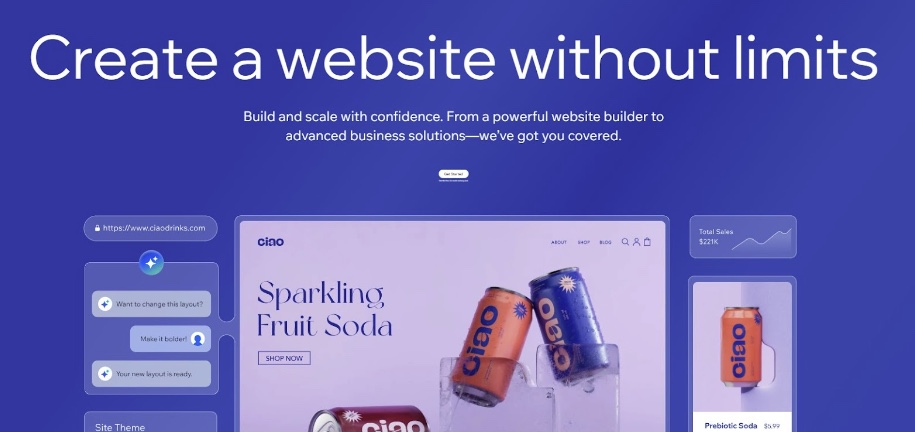Important Role of Website Design in Business Success in 2024

In today’s digital age, a well-designed website is more than just a digital storefront—it’s a crucial element that can make or break your business’s online presence. From attracting visitors to converting them into customers, every aspect of your website’s design plays a vital role in shaping user experience, enhancing SEO performance, and building brand credibility. In this guide, we’ll delve into the key reasons why investing in professional website design is essential for achieving long-term business success.
Enhancing User Experience
Creating a positive user experience (UX) on your website is essential for engaging visitors and keeping them coming back. At its core, UX encompasses how users perceive and interact with your site, aiming to make their journey smooth, intuitive, and enjoyable.
Intuitive Navigation
One of the foundations of a good user experience is intuitive navigation. This means organizing your website’s menu and structure in a logical way that makes it easy for users to find information. Consider categorizing content into clear sections and using descriptive labels for menu items. Avoid clutter by prioritizing essential pages and offering clear pathways to deeper content.
Mobile Responsiveness
With a significant portion of internet users accessing websites via smartphones and tablets, ensuring your site is mobile responsive is crucial. A responsive design dynamically adjusts your website’s layout and content based on the screen size and device orientation, providing a consistent and optimized experience across all devices. This not only improves usability but also enhances SEO, as search engines prioritize mobile-friendly sites in their rankings.
Page Loading Speed
Page loading speed directly impacts user experience and SEO. Users expect fast-loading websites and will quickly abandon slow-loading pages. Optimize your site’s performance by minimizing image sizes, leveraging browser caching, and reducing unnecessary scripts. Tools like Google PageSpeed Insights can help identify performance bottlenecks and suggest improvements to enhance loading times.
Boosting Search Engine Optimization (SEO)
Understanding how to optimize your website for search engines is vital for improving its visibility and attracting relevant traffic. Here’s a beginner’s guide to getting started with SEO:
Choosing Relevant Keywords
Keywords are the foundation of SEO. Start by identifying words and phrases that potential customers might use when searching for products or services like yours. Use tools like Google Keyword Planner or SEMrush to discover popular keywords in your industry.
Strategic Placement of Keywords
Once you have your keywords, strategically place them throughout your website. Include them in your page titles, meta descriptions (the short summaries that appear in search engine results), headings (H1, H2, H3), and within the body content. However, avoid overusing keywords (known as keyword stuffing), as this can negatively impact your SEO efforts.
Optimizing Images and Multimedia
Images and videos play a crucial role in engaging visitors, but they can also impact your SEO. Optimize images by using descriptive file names and alt text. Alt text helps search engines understand what an image is about and improves accessibility for users who cannot see images due to disabilities.
Ensuring Mobile-Friendliness
With the majority of internet users accessing websites via mobile devices, ensuring your website is mobile-friendly is crucial. Responsive design ensures your site adapts to different screen sizes and provides a seamless experience across devices. Google prioritizes mobile-friendly websites in its search rankings, making this optimization step essential.
By implementing these fundamental SEO strategies, you can enhance your website’s visibility in search engine results, attract more qualified visitors, and ultimately drive business growth. Regularly monitor your website’s performance using tools like Google Analytics to track traffic, user behavior, and keyword rankings, and adjust your SEO strategy accordingly.
Benefits of Using Online Website Builder Platforms
Online website builder platforms revolutionize the process of creating a website, offering a multitude of advantages that cater to businesses and individuals alike. These platforms eliminate the need for extensive coding knowledge, allowing users to build and customize their websites with ease. One of the primary benefits is speed and efficiency: instead of starting from scratch, users can choose from a vast array of pre-designed templates tailored to various industries and styles. Platforms like WordPress, Wix, Squarespace, and Shopify provide intuitive drag-and-drop interfaces that simplify the design and layout process, enabling users to see real-time changes without technical complexities.
Moreover, these platforms offer built-in functionalities that enhance website performance and user experience. Features such as mobile responsiveness ensure that websites look and function seamlessly across devices, which is crucial in today’s mobile-first world. Additionally, integration with third-party apps and plugins extends functionality, allowing businesses to add e-commerce capabilities, email marketing tools, and analytics platforms effortlessly.
Comparing platforms like Wix vs Squarespace reveals distinct advantages: Wix offers extensive creative freedom with its customizable templates and robust app market, catering well to creative industries and small businesses. On the other hand, Squarespace is renowned for its sleek, design-focused templates that appeal to users seeking polished aesthetics and simplicity.

By leveraging online website builder platforms, businesses can significantly reduce costs associated with hiring web developers while maintaining control over their website’s design and functionality. These platforms empower entrepreneurs and businesses of all sizes to establish a professional online presence quickly, effectively, and affordably, paving the way for growth and success in the digital marketplace.
Building Brand Credibility
Building credibility for your brand through your website is essential for gaining the trust of potential customers and encouraging conversions. A credible website reassures visitors that your business is legitimate, reliable, and capable of meeting their needs. Here are key strategies to enhance your brand credibility:
Investing in a professional and visually appealing website design is crucial. A well-designed website with high-quality images, intuitive navigation, and a clean layout not only captures attention but also communicates professionalism. Visual consistency, including using your brand colors and logo consistently across all pages, reinforces brand identity and leaves a lasting impression on visitors.
Displaying genuine customer testimonials and reviews prominently on your website provides social proof of your product or service’s quality and reliability. Potential customers are more likely to trust the opinions and experiences of others who have used your products or services before making a purchase decision. Encourage satisfied customers to leave reviews and showcase them strategically on your homepage and product pages.
An informative and transparent About Us page helps humanize your brand and build trust with visitors. Use this page to tell your brand story, highlight your mission and values, and introduce the team behind your company. Including photos and bios of key team members adds a personal touch and reinforces the credibility of your business.
Demonstrate your commitment to protecting customers’ information by prominently displaying security measures such as SSL certificates and secure payment gateways. Clearly outline your privacy policy and terms of service to build transparency and reassure visitors that their personal data is safe and protected.
Highlight any industry awards, certifications, or affiliations that your business has received. Displaying badges or logos from reputable organizations or industry associations on your website reinforces your credibility and expertise in your field. These accolades serve as third-party endorsements of your business’s capabilities and achievements.
Provide responsive customer support options such as live chat, contact forms, and dedicated customer service channels. Promptly responding to inquiries and resolving issues demonstrates your commitment to customer satisfaction and reinforces your brand’s reliability and responsiveness.
Conclusion
Website design is a dynamic and essential aspect of achieving and maintaining business success in today’s digital landscape. Beyond creating an initial online presence, effective website design involves continuous optimization and refinement. By leveraging tools like website analytics, businesses can gain invaluable insights into user behavior, preferences, and conversion patterns. This data empowers informed decision-making to enhance the website’s performance and effectiveness over time.
A well-designed website serves as more than just a digital storefront; it acts as a powerful tool to attract visitors, convert them into loyal customers, and strengthen brand identity. It plays a critical role in enhancing user experience through intuitive navigation, mobile responsiveness, and engaging content. Moreover, a professionally designed website builds credibility and trust among potential customers, reinforcing the reliability and expertise of the business.
Ultimately, investing in website design is an investment in long-term growth and profitability. By continually adapting to technological advancements and evolving consumer expectations, businesses can stay ahead of the competition. A strategic approach to website design not only drives immediate results in terms of traffic and conversions but also lays a foundation for sustainable business growth in the digital age.
Spotted something? Got a story? Email: [email protected]
Latest News
